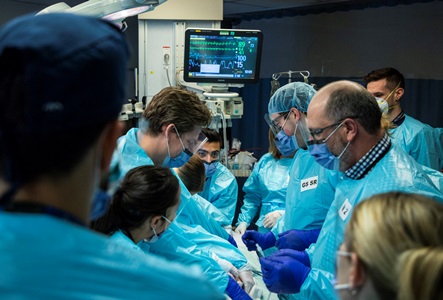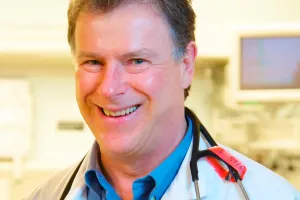How likely are you to survive in-hospital cardiac arrest? Newly identified risk factors can help with difficult decisions
 A paper published in The BMJ is the first to identify risk factors that affect patient survival after in-hospital cardiac arrest. This new information can help patients, families and care providers decide on their care goals upon admission to hospital.
A paper published in The BMJ is the first to identify risk factors that affect patient survival after in-hospital cardiac arrest. This new information can help patients, families and care providers decide on their care goals upon admission to hospital.
Contrary to what's seen on medical TV shows, people who go into cardiac arrest in hospital are unlikely to survive. Even with prompt CPR and artificial defibrillation, their chance of survival to hospital discharge is between 12 to 25 percent. This reality is often poorly understood by patients and their families.
A research team led by Dr. Shannon Fernando performed a systematic review that included over 300,000 patients from around the world who experienced in-hospital cardiac arrest.
They found factors associated with decreased survival included male sex, age over 60, chronic kidney disease, and cancer.
Factors associated with a greater chance of survival included having a shockable rhythm, having someone witness the arrest, being hooked up to a monitor, and the arrest happening during the day.
The researchers caution that they only identified individual risk factors, and they do not know how these factors affect survival when combined. Their findings could be used in future to create a clinical prediction tool to estimate chance of survival after cardiac arrest.
However, these results could help care providers and patients and families have discussions about goals of care, and whether to use CPR in the event of cardiac arrest. Patient representatives who reviewed the study agreed that this information helped them better understand the likelihood of survival after in-hospital cardiac arrest, and would inform their own decisions related to CPR.
"While many healthcare providers might not be surprised by these findings, most patients will be. This new information can help patients, families and care providers work together to decide on care goals well before their loved-one goes into cardiac arrest in hospital," said Dr. Shannon Fernando, Emergency Medicine and Adult Critical Care Medicine resident at The Ottawa Hospital and the University of Ottawa
Authors: Shannon M. Fernando, Alexandre Tran, Wei Cheng, Bram Rochwerg, Monica Taljaard, Christian Vaillancourt, Kathryn M. Rowan, David A. Harrison, Jerry P. Nolan, Kwadwo Kyeremanteng, Daniel I. McIsaac, Gordon H. Guyatt, Jeffrey J. Perry
Acknowledgements: Patient representatives Maxime Lê, Susan Rich, and other (wishing to remain anonymous).
Source: The BMJ
Funding: This study received no designated funding. Research at The Ottawa Hospital is possible because of generous donations to the hospital.
Core Resources: Ottawa Methods Centre
The Ottawa Hospital: Inspired by research. Driven by compassion
The Ottawa Hospital is one of Canada's largest learning and research hospitals with over 1,100 beds, approximately 12,000 staff and an annual budget of over $1.2 billion. Our focus on research and learning helps us develop new and innovative ways to treat patients and improve care. As a multi-campus hospital, affiliated with the University of Ottawa, we deliver specialized care to the Eastern Ontario region, but our techniques and research discoveries are adopted around the world. We engage the community at all levels to support our vision for better patient care. See www.ohri.ca for more information about research at The Ottawa Hospital.
University of Ottawa: --A crossroads of cultures and ideas
The University of Ottawa is home to over 50,000 students, faculty and staff, who live, work and study in both French and English. Our campus is a crossroads of cultures and ideas, where bold minds come together to inspire game-changing ideas. We are one of Canada's top 10 research universities--our professors and researchers explore new approaches to today's challenges. One of a handful of Canadian universities ranked among the top 200 in the world, we attract exceptional thinkers and welcome diverse perspectives from across the globe. www.uottawa.ca
Media Contact
Amelia Buchanan
Senior Communication Specialist
Ottawa Hospital Research Institute
Office: 613-798-5555 x 73687
Cell: 613-297-8315
ambuchanan@ohri.ca
Learn more about:
The Ottawa Hospital is a leading academic health, research and learning hospital proudly affiliated with the University of Ottawa and supported by The Ottawa Hospital Foundation.


